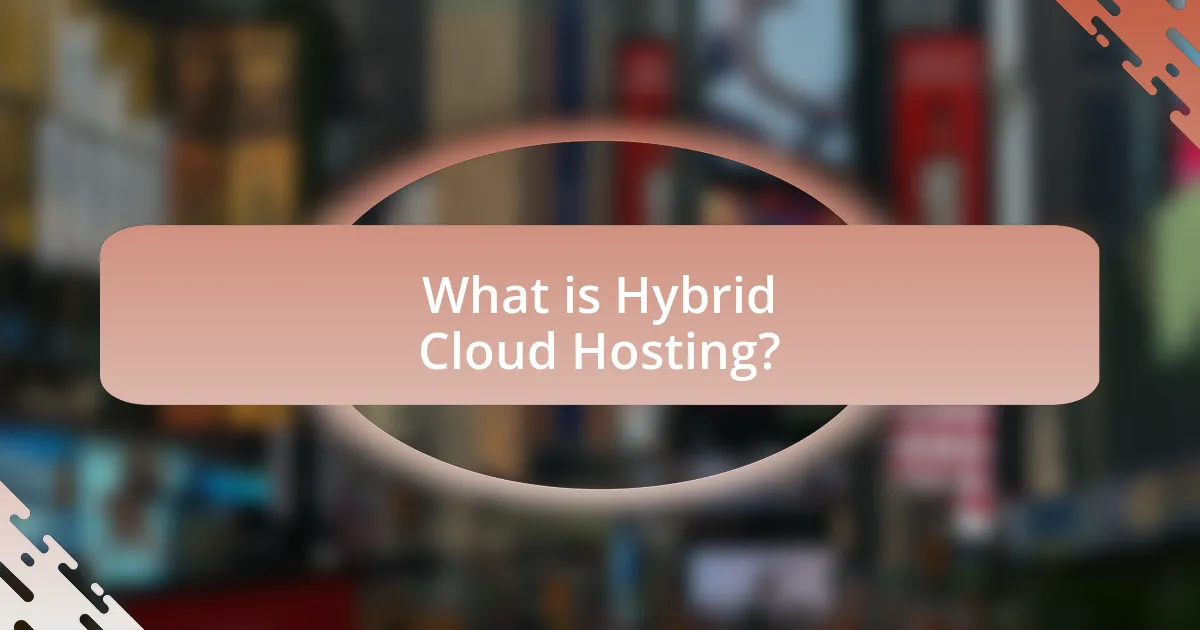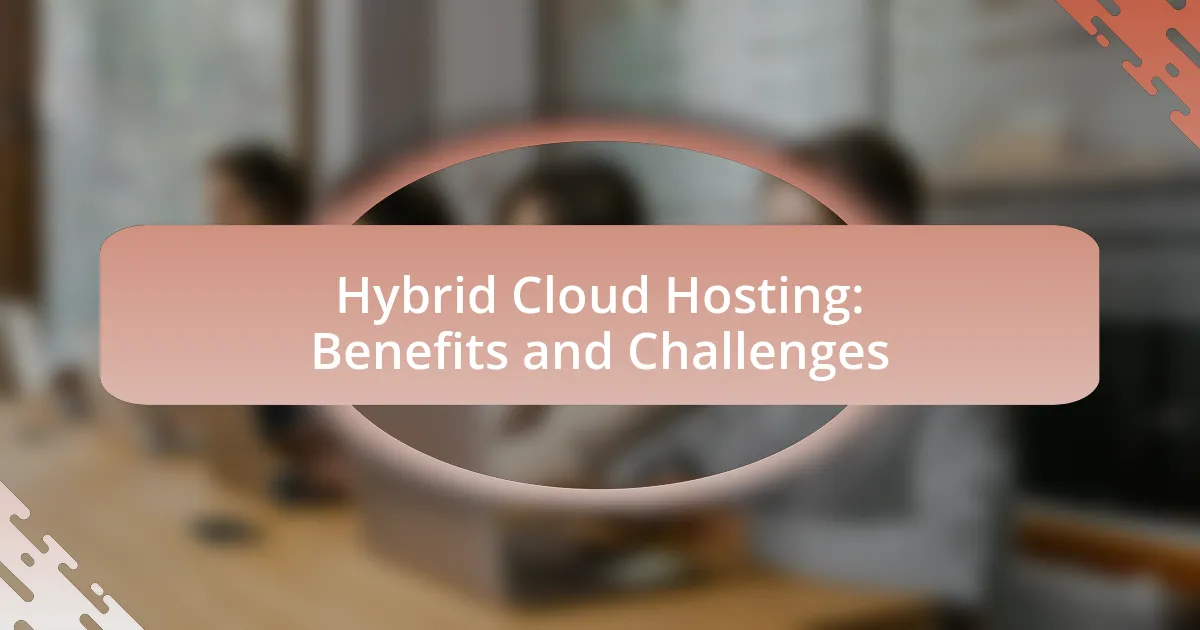Hybrid cloud hosting is a computing model that integrates both public and private cloud services, enabling organizations to share data and applications while benefiting from the scalability of public clouds and the security of private clouds. This article explores the differences between hybrid cloud hosting and traditional cloud models, highlighting its key components, benefits, and challenges. It discusses how public and private clouds interact, the cost advantages and disaster recovery improvements offered by hybrid solutions, and the complexities and security concerns that organizations must navigate. Additionally, the article outlines best practices for implementing hybrid cloud strategies and examines future trends, including the role of AI and automation in optimizing hybrid cloud environments.

What is Hybrid Cloud Hosting?
Hybrid cloud hosting is a computing environment that combines both public and private cloud services, allowing data and applications to be shared between them. This model enables organizations to leverage the scalability and cost-effectiveness of public clouds while maintaining the security and control of private clouds. According to a report by Gartner, 70% of organizations will adopt a hybrid cloud model by 2022, highlighting its growing importance in modern IT strategies.
How does Hybrid Cloud Hosting differ from traditional cloud models?
Hybrid Cloud Hosting combines both public and private cloud environments, allowing for greater flexibility and scalability compared to traditional cloud models, which typically rely solely on either public or private infrastructure. This hybrid approach enables organizations to keep sensitive data secure in a private cloud while leveraging the cost-effectiveness and scalability of public cloud resources for less critical applications. According to a report by Gartner, 70% of organizations will adopt a hybrid cloud model by 2022, highlighting the growing preference for this flexible architecture over traditional models.
What are the key components of Hybrid Cloud Hosting?
The key components of Hybrid Cloud Hosting include on-premises infrastructure, private cloud services, public cloud services, and a secure network connection. On-premises infrastructure allows organizations to maintain control over sensitive data, while private cloud services provide dedicated resources for specific applications. Public cloud services offer scalability and flexibility for variable workloads. A secure network connection integrates these components, ensuring seamless data transfer and communication between the private and public environments. This architecture enables businesses to optimize resource allocation and enhance operational efficiency.
How do public and private clouds interact in a hybrid model?
Public and private clouds interact in a hybrid model through seamless integration, allowing data and applications to be shared between the two environments. This interaction enables organizations to leverage the scalability and cost-effectiveness of public clouds while maintaining control and security over sensitive data in private clouds. For instance, businesses can run non-sensitive workloads on public clouds and keep critical applications in private clouds, facilitating a flexible and efficient resource allocation strategy. This hybrid approach is supported by technologies such as APIs and cloud management platforms, which ensure smooth data transfer and interoperability between the two cloud types.
What are the primary benefits of Hybrid Cloud Hosting?
The primary benefits of Hybrid Cloud Hosting include enhanced flexibility, improved scalability, and increased security. Hybrid cloud solutions allow businesses to utilize both public and private cloud resources, enabling them to scale their infrastructure according to demand while maintaining control over sensitive data. For instance, a study by Gartner indicates that organizations leveraging hybrid cloud strategies can achieve up to 30% cost savings on IT infrastructure by optimizing resource allocation. Additionally, hybrid cloud environments can enhance disaster recovery capabilities, as data can be backed up across multiple locations, ensuring business continuity.
How does Hybrid Cloud Hosting enhance flexibility for businesses?
Hybrid Cloud Hosting enhances flexibility for businesses by allowing them to combine on-premises infrastructure with public cloud resources. This integration enables organizations to scale their IT resources dynamically based on demand, facilitating cost-effective resource allocation. For instance, during peak usage times, businesses can leverage additional public cloud capacity without the need for significant upfront investment in hardware. According to a report by Gartner, organizations utilizing hybrid cloud solutions can achieve up to 30% cost savings by optimizing their resource usage. This adaptability not only supports varying workloads but also allows businesses to maintain control over sensitive data while benefiting from the scalability of the cloud.
What cost advantages does Hybrid Cloud Hosting provide?
Hybrid Cloud Hosting provides significant cost advantages by optimizing resource allocation and reducing capital expenditures. Organizations can leverage both on-premises infrastructure and cloud resources, allowing them to scale services based on demand without the need for large upfront investments in hardware. This flexibility leads to lower operational costs, as businesses only pay for the cloud resources they use, which can be up to 30% cheaper than maintaining a fully on-premises solution. Additionally, hybrid models enable companies to avoid over-provisioning and under-utilization of resources, further enhancing cost efficiency.
How does Hybrid Cloud Hosting improve disaster recovery options?
Hybrid Cloud Hosting enhances disaster recovery options by providing a flexible and scalable infrastructure that allows organizations to back up data across multiple environments. This dual approach enables businesses to maintain critical operations during outages by leveraging both on-premises and cloud resources. For instance, in the event of a local disaster, data can be quickly restored from the cloud, minimizing downtime. Additionally, hybrid cloud solutions often include automated backup processes and geographic redundancy, which further ensure data integrity and availability. According to a report by Gartner, organizations utilizing hybrid cloud strategies can reduce recovery time objectives (RTOs) by up to 50%, demonstrating the effectiveness of this model in improving disaster recovery capabilities.
What challenges are associated with Hybrid Cloud Hosting?
Hybrid cloud hosting presents several challenges, including security concerns, complexity in management, and potential latency issues. Security is a significant challenge due to the need to protect data across multiple environments, which can lead to vulnerabilities if not properly managed. Complexity arises from the integration of on-premises and cloud resources, requiring skilled personnel to manage and optimize the hybrid environment effectively. Additionally, latency can occur when data is transferred between local and cloud infrastructures, potentially impacting application performance. These challenges necessitate careful planning and robust strategies to ensure a secure and efficient hybrid cloud deployment.
What security concerns should businesses consider with Hybrid Cloud Hosting?
Businesses should consider data security, compliance, and access control as primary security concerns with Hybrid Cloud Hosting. Data security is critical because sensitive information may be stored across both public and private clouds, increasing the risk of unauthorized access or data breaches. Compliance with regulations such as GDPR or HIPAA is essential, as failure to meet these standards can result in significant fines and legal repercussions. Access control is vital to ensure that only authorized personnel can access sensitive data, which can be challenging in a hybrid environment where multiple platforms are involved. According to a 2021 report by the Cloud Security Alliance, 64% of organizations cited data breaches as a top concern when using hybrid cloud solutions, highlighting the importance of addressing these security issues effectively.
How can complexity in management affect Hybrid Cloud Hosting?
Complexity in management can significantly hinder the effectiveness of Hybrid Cloud Hosting by creating inefficiencies and increasing the risk of errors. When management structures are convoluted, decision-making processes become slower, leading to delays in deploying resources and responding to issues. For instance, a study by Gartner indicates that organizations with complex management frameworks experience a 30% increase in operational costs due to inefficiencies. Additionally, unclear roles and responsibilities can result in miscommunication, which may compromise data security and compliance in hybrid environments. Therefore, streamlined management is essential for optimizing the benefits of Hybrid Cloud Hosting.
What are the potential compliance issues with Hybrid Cloud Hosting?
Potential compliance issues with Hybrid Cloud Hosting include data sovereignty, regulatory adherence, and security standards. Data sovereignty concerns arise because data may be stored in multiple jurisdictions, each with its own laws governing data protection and privacy. Regulatory adherence is critical, as organizations must ensure that their hybrid cloud solutions comply with industry-specific regulations, such as GDPR for European data or HIPAA for healthcare information in the U.S. Additionally, security standards must be consistently applied across both public and private cloud environments to mitigate risks of data breaches and unauthorized access. Failure to address these compliance issues can lead to legal penalties, reputational damage, and loss of customer trust.
How can businesses effectively implement Hybrid Cloud Hosting?
Businesses can effectively implement Hybrid Cloud Hosting by first assessing their specific needs and workloads to determine the optimal balance between public and private cloud resources. This assessment allows organizations to identify which applications and data should reside in the private cloud for security and compliance, and which can leverage the scalability and cost-effectiveness of the public cloud.
Next, businesses should select a reliable cloud service provider that offers seamless integration capabilities, ensuring that both cloud environments can communicate effectively. Implementing robust security measures, such as encryption and access controls, is crucial to protect sensitive data across both environments.
Additionally, businesses should establish clear governance policies and management tools to monitor performance, costs, and compliance across the hybrid cloud infrastructure. According to a report by Gartner, organizations that adopt a hybrid cloud strategy can reduce IT costs by up to 30% while improving agility and innovation. This data underscores the effectiveness of a well-implemented hybrid cloud strategy.
What best practices should be followed for a successful Hybrid Cloud strategy?
A successful Hybrid Cloud strategy should prioritize clear governance and compliance frameworks. Establishing a governance model ensures that data management, security policies, and compliance requirements are consistently applied across both on-premises and cloud environments. According to a report by Gartner, organizations that implement strong governance frameworks can reduce security incidents by up to 50%. Additionally, integrating automation tools for workload management enhances efficiency and scalability, allowing businesses to respond quickly to changing demands. Research from IDC indicates that companies leveraging automation in their hybrid cloud strategies experience a 30% increase in operational efficiency. Finally, continuous monitoring and optimization of resources are essential to ensure performance and cost-effectiveness, as highlighted by a study from Forrester, which found that organizations that regularly assess their hybrid cloud environments can achieve up to 20% cost savings.
How can organizations ensure seamless integration between cloud environments?
Organizations can ensure seamless integration between cloud environments by implementing standardized APIs and utilizing cloud management platforms. Standardized APIs facilitate communication between different cloud services, allowing for interoperability and data exchange. Cloud management platforms provide a unified interface for managing resources across multiple cloud environments, enhancing visibility and control. According to a report by Gartner, organizations that adopt a multi-cloud strategy with integrated management tools can reduce operational costs by up to 30%, demonstrating the effectiveness of these integration methods.
What are the future trends in Hybrid Cloud Hosting?
Future trends in Hybrid Cloud Hosting include increased adoption of artificial intelligence and machine learning for resource optimization, enhanced security measures through zero-trust architectures, and greater integration of edge computing to support real-time data processing. The rise of AI and machine learning allows organizations to analyze workloads and optimize resource allocation dynamically, improving efficiency. Security enhancements, particularly zero-trust models, are becoming essential as cyber threats evolve, ensuring that every access request is verified. Additionally, the integration of edge computing facilitates faster data processing and reduced latency, which is crucial for applications requiring immediate responses. According to a report by Gartner, by 2025, 70% of organizations will have adopted a hybrid cloud model, underscoring the growing trend towards this hosting solution.
How is technology evolving to support Hybrid Cloud solutions?
Technology is evolving to support Hybrid Cloud solutions through advancements in orchestration tools, improved security protocols, and enhanced interoperability between public and private cloud environments. Orchestration tools, such as Kubernetes, enable seamless management of workloads across different cloud platforms, allowing organizations to optimize resource allocation and scalability. Improved security protocols, including zero-trust architectures and advanced encryption methods, ensure data protection across hybrid environments, addressing compliance and regulatory requirements. Enhanced interoperability is facilitated by APIs and cloud management platforms that enable smooth integration and communication between disparate systems, thus streamlining operations and improving efficiency. These technological advancements collectively empower businesses to leverage the flexibility and cost-effectiveness of hybrid cloud solutions while maintaining control over their data and applications.
What role will AI and automation play in Hybrid Cloud Hosting?
AI and automation will significantly enhance Hybrid Cloud Hosting by optimizing resource management, improving scalability, and ensuring security. AI algorithms can analyze workloads and dynamically allocate resources between on-premises and cloud environments, leading to cost efficiency and performance improvements. Automation tools streamline deployment processes, reduce human error, and enable faster recovery from failures. According to a report by Gartner, organizations that implement AI-driven automation in their cloud strategies can reduce operational costs by up to 30%. This integration of AI and automation not only facilitates seamless operations but also empowers businesses to adapt quickly to changing demands in a hybrid cloud environment.
What practical tips can help optimize Hybrid Cloud Hosting?
To optimize Hybrid Cloud Hosting, organizations should implement a multi-cloud strategy, ensuring workload distribution across various cloud environments. This approach enhances flexibility and reduces dependency on a single provider, which can lead to cost savings and improved performance. Additionally, utilizing automation tools for resource management can streamline operations, allowing for dynamic scaling based on demand. According to a report by Gartner, companies that adopt multi-cloud strategies can reduce costs by up to 30% while improving service reliability. Regularly monitoring performance metrics and adjusting configurations based on real-time data further ensures optimal resource utilization and responsiveness to changing business needs.


